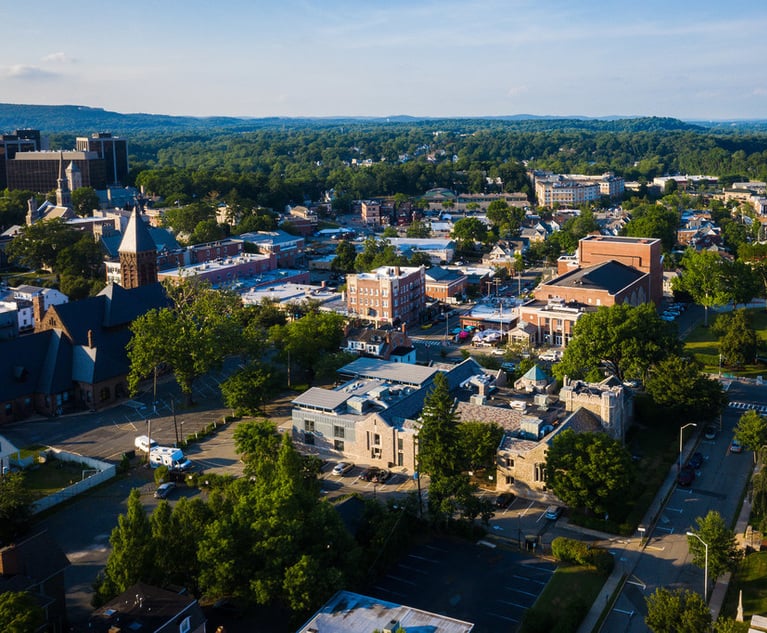After COVID-19 and a severe judge shortage put a cramp on proceedings, federal courts in New Jersey have shown an impressive turnaround, and the days of apologizing to clients and out-of-state counsel about slow-moving cases are over, according to federal practitioners.
With the addition of six new judges nominated by President Joe Biden, criminal and civil trials are a regular occurrence, practitioners said.
Even with COVID restrictions and the judge shortage relegated to history, some think the district is ready for an expansion of the number of authorized judgeships.
The district stands at a crossroads, with Freda Wolfson, the chief judge for the past four years, departing effective Feb. 1, and Renee Marie Bumb set to take over the top position.
Although a few cases were tried during the pandemic, most cases awaiting trial came to a standstill for a time during the depths of COVID-19.
In addition, during the administration of President Donald Trump, the district saw six out of 17 judgeships go empty due to an inability of Trump and the state’s two senators, Robert Menendez and Cory Booker, to agree on candidates.
But since Biden took office, the district has seen the confirmation of six new judges between June 2021 and June 2022—Julien Neals, Zahid Qaraishi, Christine O’Hearn, Karen Williams, Georgette Castner and Evelyn Padin.
Practicing in the District of New Jersey has sometimes meant explaining the slow pace of proceedings, said Jennifer Mara of Baldassare & Mara in Roseland, who handles both civil and criminal cases in federal court. But she sees that pace picking up.
“I’ve seen a loosening up that seems to be pointing in the right direction in terms of having motions and other applications addressed in a pretty timely manner,” Mara said.
“A couple of years ago, I was telling lead counsel on a number of cases, we’re down a whole bunch of judges, and the courts are overloaded. And then we had a pandemic in the mix. So I was telling them things are going to sit. You file a motion, I wouldn’t expect a decision for quite some time because things are really clogged and the courts are overburdened,” Mara said.
“Now,” Mara said, “I tell them things are moving a lot more quickly than they used to, and we do have a lot more judges that have been seated. I think it’s moved in the right direction. So I haven’t given any of them that dire warning that I used to give pretty regularly,” Mara said.
“I was negative for a while because I always had to explain the state of affairs to my co-counsel out of state. But now I feel like things are moving in the right direction,” she said.
‘Getting Back to Business’
Michael Furey, who handles commercial litigation and employment matters at Day Pitney, likewise sees improvements in the functioning of the District of New Jersey since the arrival of the six new judges. But he still believes the District of New Jersey doesn’t move cases as swiftly as courts in other jurisdictions.
“I think the federal courts are getting back to business, and they have been for some time. Trials are being held, motions are being argued. Some judges are better than others at getting their decisions out,” Furey said. “I’m not sure if the problem now is COVID-related. I think it’s more just the practices of certain judges as to how conscientious they are in getting their decisions done.”
Furey said he believes the state’s federal courts are mainly trying criminal cases and some more civil trials but not complex civil trials.
As for the oft-repeated explanation that New Jersey’s federal judges have a heavier caseload than their counterparts elsewhere, Furey said, “I’m not sure that’s a complete explanation, but it’s a complex issue to be able to identify why it is that our cases may take longer than cases in other jurisdictions to resolve themselves. We certainly don’t have a rocket docket in New Jersey,” he said.
Furey says that although the district has new judges, inexperience isn’t the reason some are taking longer to clear cases. “I think some are more disciplined, some are working harder than others. I am optimistic that it’s going to get better, but I am concerned that it’s going to take longer than any of us would like and, frankly, longer than it should,” Furey said.
More Judges
Federal judicial officials in Washington have called for more authorized judgeships for the District of New Jersey, but Congress has yet to approve an expansion of the state’s District Court bench.
in 2021 the Judicial Conference of the United States, the policymaking arm of the federal judiciary, recommended that authorized judgeships in the District of New Jersey should be increased to 22 from the present level of 17.
The call for more judgeships was based on the high level of case filings in the district.
Lawmakers introduced legislation in both houses of Congress in 2021 to create the five new judgeships in New Jersey, and dozens of others nationwide, but the bills did not advance.
‘MDLs Are Very Time-Consuming’
Aside from staffing issues, some lawyers think the proliferation of multidistrict litigation assigned to New Jersey is a drain on the state’s judicial resources.
New Jersey has 11 pending MDLs. Most are small, such as the FieldTurf litigation by school districts over artificial turf sales practices, accounting for 17 open cases, but there are also 38,618 suits pending against Johnson & Johnson over allegations that its talc products cause cancer.
“MDLs are very time-consuming for the judge and his or her staff, and it prevents or delays the judge from being able to handle other kinds of cases. Maybe our new chief judge should start looking at that issue. If MDLs are causing a delay, we should take fewer,” Furey said.
Wolfson, speaking at the close of her term as chief judge, said litigators should continue to be patient.
“There’s going to be some backlog, considering for about a year we couldn’t get in for trials,” Wolfson said.
“We are going full steam ahead right now. Every judge has been scheduling their matters and trials however they want going forward, with no restriction. We are 100% the way we were before [the pandemic],” she said.
Backlogs vary from one judge to another, since every judge handles their docket differently, Wolfson said.
“Obviously, in the civil area, the best way to get a case to settle is to give it a trial date. We couldn’t do that back then. It’s happening more now,” Wolfson said.
“For those lawyers out there who think things are maybe a little slower than they want, be a little patient. We’re all going to get there. If there are some blips along the way, hopefully we’ll recover from them. And just remember every judge is different like every lawyer is different,” Wolfson said.
Packed Trial Schedule
Laura Mattiacci, a plaintiff-side employment lawyer at Console Mattiacci in Moorestown, says the pace of proceedings in the District of New Jersey is picking up. Her firm has a “packed” trial schedule for the next six to eight months, she said.
During the pandemic, judges in the District of New Jersey, for the most part, handled cases normally up until the point of trial, Mattiacci said. Judges would sometimes rule on summary judgment motions, but then, instead of going to trial the following month, the case would just sit, she said.
“This time last year, I felt the courts were more backed up. But then judges began setting date certains for trial. I believe this helped clear up the backlog, because with a firm date set for trial, many cases tend to settle,” Mattiacci said.
Daniel Fleming, vice president at Wong Fleming in Princeton, says the District of New Jersey is hopelessly backlogged, more than other federal courts. And he is not optimistic about seeing that improve soon.
“There’s not enough judges in New Jersey. The District Court in New Jersey has nowhere near the amount of district judges they need to handle the volume of cases they have. I see that getting worse,” Fleming said.
“We’re still seeing a backlog of cases in terms of getting them disposed of a trial. A couple of years ago, if you filed a dispositive motion, it took you six months to get a ruling. I think it’s taking longer now,” Fleming said.
Litigating in the District of New Jersey still entails explaining the slow pace to the client, Fleming said.
“Clients don’t like the fact that they hire a lawyer and they pay them money and now they’ve got to wait, and litigation gets really expensive. You have to figure out a way to find a solution for the client,” Fleming said.
Often, that means mediation, if the adversary is so inclined, he said. “It’s something that’s the only remedy out there. Otherwise you have to wait.”
‘Impressive’
Mary Toscano, a white-collar defense lawyer at Sills Cummis & Gross, says those trials being held are still mostly criminal cases.
Toscano said she hears complaints from colleagues that dispositive motions in federal court take a long time, sometimes more than six months. But she says, “I have not experienced that and I think that’s testament to the fact that they now have a full court.”
Toscano said she salutes Wolfson’s effort to keep court proceedings moving during the pandemic, such as holding a remote grand jury.
“Our courts were innovative in how they handled things in New Jersey,” Toscano said. “They have kept the wheels of justice moving forward—impressively so.”
NOT FOR REPRINT
© 2024 ALM Global, LLC, All Rights Reserved. Request academic re-use from www.copyright.com. All other uses, submit a request to [email protected]. For more information visit Asset & Logo Licensing.


 (l-r) Jennifer Mara of Baldassare & Mara, Mary Toscano of Sills Cummis, Laura Mattiacci of Console Mattiacci, Daniel Fleming of Wong Fleming, and Michael Furey of Day Pitney. Courtesy photos
(l-r) Jennifer Mara of Baldassare & Mara, Mary Toscano of Sills Cummis, Laura Mattiacci of Console Mattiacci, Daniel Fleming of Wong Fleming, and Michael Furey of Day Pitney. Courtesy photos






